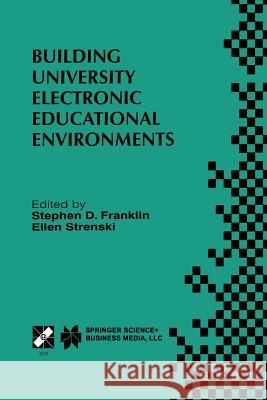Building University Electronic Educational Environments: Ifip Tc3 Wg3.2/3.6 International Working Conference on Building University Electronic Educati » książka
Building University Electronic Educational Environments: Ifip Tc3 Wg3.2/3.6 International Working Conference on Building University Electronic Educati
ISBN-13: 9781475746945 / Angielski / Miękka / 2013 / 276 str.
Building University Electronic Educational Environments: Ifip Tc3 Wg3.2/3.6 International Working Conference on Building University Electronic Educati
ISBN-13: 9781475746945 / Angielski / Miękka / 2013 / 276 str.
(netto: 766,76 VAT: 5%)
Najniższa cena z 30 dni: 771,08
ok. 22 dni roboczych.
Darmowa dostawa!
The Internet and the World Wide Web are deeply affecting the way things are traditionally done. E-commerce is changing businesses; the stock market is accessible to individuals; digitized journals, up-to-date databases, and newsgroups are changing the lives of researchers. Is it reasonable to think that learning will remain unaffected? Nevertheless, universities, with their blend of teaching and research, have much to offer to those who wish to learn more than simple skills: judgment, initiative, and fair competition for research positions. Over the years, universities have acquired invaluable resources in the form of laboratories and libraries with specially trained staff. How can they evolve to take advantage of the many possibilities of the Internet and broadband communication? Many institutions of higher education are trying to integrate new information and communications technologies into current curricula or to develop new learning paradigms for learning. Because it is still so early in the game they are eager to compare their efforts and results to the achievements of others and are willing to learn from them. The International Federation for Information Processing (IFIP) is a multi- national federation of professional and technical organizations, founded in 1960 under the auspices of UNESCO, whose mission is to assist in the development, exploitation, and application of Information Technology for the benefit of all peoples. Given this scope of activity, IFIP seemed the appropriate body to give an international dimension to such a forum.











